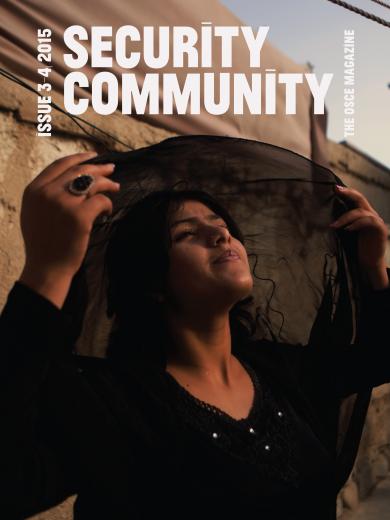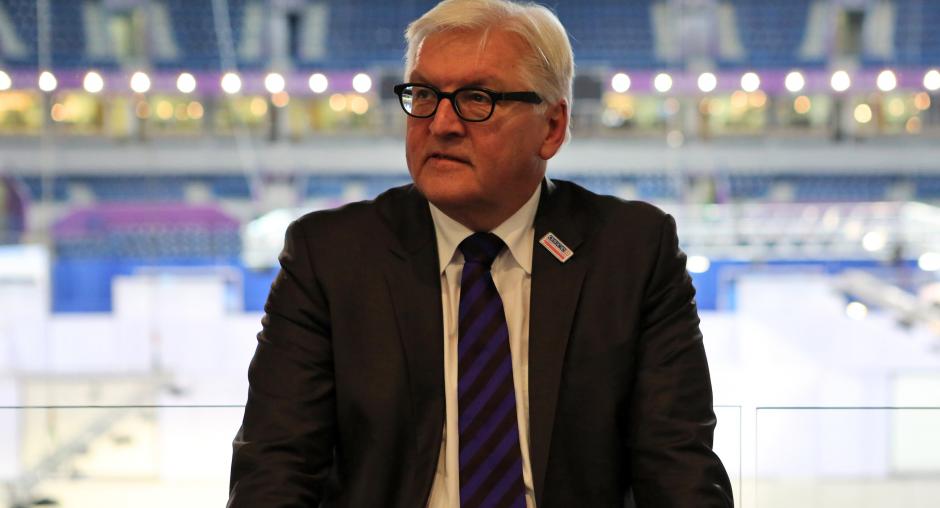Interview with the OSCE Chairperson-in-Office, German Federal Minister for Foreign Affairs Frank-Walter Steinmeier
At the OSCE Ministerial Council in Belgrade you mentioned that the OSCE is navigating turbulent waters. What leadership style can we expect from the skipper of the ship in 2016?
The 16th century Italian Jesuit priest Claudio Acquaviva once wrote “Fortiter in re, suaviter in modo” - vigorous in deed, gentle in manner. All participating States have committed themselves to a large set of principles, starting with the “Helsinki Final Act” and its “Decalogue”, and all States have reconfirmed their adherence to the OSCE principles many times since, in the Charter of Paris in 1990 and more recently in the Astana Commemorative Declaration. We will not compromise on this substance. At the same time, the “spirit of Helsinki” defines a clear method: persistent dialogue and a co-operative approach. During our OSCE Chairmanship, we will therefore put a focus on three areas: renewing dialogue, rebuilding trust and restoring security.
In the anniversary year of the Helsinki Final Act, fundamental principles of European security as set out in the OSCE’s founding document continue to be violated. What will be your strategy for setting this right?
The breach of OSCE principles and international law has to be called by its name, of course. At the same time, we have to try hard to overcome the spreading speechlessness in Europe: In these times of severe crisis we should, more than ever, hold firm to the path laid out by the CSCE process and to engage in serious dialogue, rebuilding trust and rebuilding security. Anything else would only accentuate the fault lines we are currently seeing on the European continent.
In what formats could meaningful dialogue be restored in the OSCE?
Facilitating dialogue is one of the main purposes of the OSCE, particularly in stormy times. The variety of platforms the organization provides to that end is one of its main assets. The OSCE has developed proven fora in all its dimensions over the past decades: we will rely on these well-established dialogue formats.
We also plan a series of Chairmanship events, at both political and expert levels, throughout the year – steering a clear course towards the Ministerial Council in Hamburg. The location for this major annual meeting of the OSCE ministers is well chosen: no other German city symbolizes worldliness, tolerance and international connectedness quite like Hamburg.
Do you have proposals for how the OSCE could react more effectively to crises?
The crisis in and around Ukraine has shown that the OSCE can provide us with essential instruments for de-escalation in times of crisis, in particular as regards the rapid establishment and swift deployment of the Special Monitoring Mission to Ukraine in the spring of 2014. Effective co-operation among OSCE participating States is possible, when and if the political will exists. What we have to work for is to ensure that the OSCE is ready to fulfil its mandate for security and accomplish its operational tasks. With this in mind, we should review some of the OSCE structures and processes, in particular with regard to early warning, conflict analysis, mediation and operational capacities. We will therefore aim to initiate a discussion process on OSCE capabilities in crisis response and management throughout all stages of the conflict cycle - including a reflection on adequate funding. We should be aware that a lack of resources would curtail the OSCE’s efficiency in the field.
What steps should the OSCE take to reduce military risks?
We have to revitalize confidence- and security-building measures and co-operative arms control. They have helped us to reduce military risks in the past. With increased military activity in the OSCE area we need them more than ever. Unfortunately the instruments we have – namely those of the Vienna Document – have not been adapted to current challenges and military realities in quite a while. That is why working on this badly needed update is one of our priorities in 2016.
Adapted to the current situation, the Vienna Document can continue to play a valuable role in reducing military risks today. Via the obligatory information exchange, prior announcement or by ensuring the possibility for mutual observation, it can help to enhance transparency of armed forces and in particular of military activities. That way it can contribute to avoiding some of the great perils of the current security environment, namely dangerous misperceptions and unintended escalation.
You have chosen to focus on good governance in this year’s Economic and Environmental Forum. Why?
Good governance is a prerequisite for connectivity and closer economic exchange. It plays a key role when it comes to the fight against corruption, better investment conditions and challenges in environmental governance and labour migration. We will therefore highlight these aspects, both within the Economic and Environmental Forum and in a business conference in Berlin in May.
Many security challenges affecting our societies today, migration being a major one, stem from outside the OSCE area. How can the OSCE address these?
Indeed, our societies face a number of great challenges and threats with external root causes. This concerns migration, but also international terrorism, radicalization, drug trafficking and human trafficking.
Besides the numerous OSCE programmes and activities in the field, I consider the OSCE’s Partners for Co-operation to be key actors in tackling these problems jointly. The conference with the Mediterranean Partners in Jordan in October 2015 provided a very good starting point for engaging in deeper cross-regional dialogue and coordinating our efforts vis-à-vis the growing challenges.
How do you see the OSCE’s role in the fight against terrorism?
The appalling attacks we had to witness in the past months and years have clearly shown that bi- and multilateral co-operation as well as the exchange of best practices must be considerably boosted. I am convinced that the OSCE can facilitate such indispensable exchanges, both at the political and expert level. With a particular focus on the threat of jihadism, we are preparing a conference for 2016 that should focus on returning foreign fighters and the tremendous challenges linked to their reintegration in our societies.
Do we need a stronger – including financially stronger – OSCE today?
In the current challenging environment, the OSCE has proven its indispensable value as a forum for dialogue and as a recognized crisis manager, especially in Ukraine. In our view, these significant capabilities should be preserved and, where necessary, updated in order to make them fit for the future. In my view, this means this has to go along with providing for the necessary human and financial resources to fulfil the tasks assigned. More OSCE for less money is not a promising concept.
Welcome to Security Community
Security Community is the OSCE’s online space for expert analysis and personal perspectives on security issues.
The views expressed in the articles are those of the authors and do not necessarily reflect the official position of the OSCE and its participating States.


